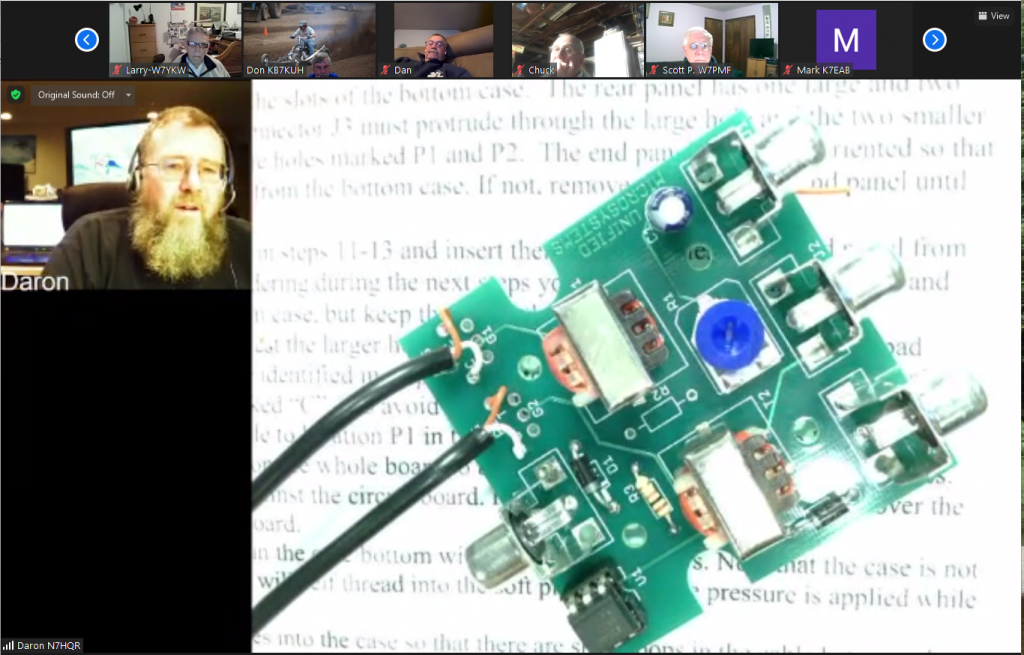Some links Daron dropped into the chat on tonight’s Wednesday Workshop on working satellites:
License Fee Clarification
ARRL News | New FCC Application Fee Will Not Apply To Amateur Radio License Upgrades
The Federal Communications Commission (FCC) staff has clarified in response to an ARRL request that the new $35 application fee will not apply to most license modifications, including those to upgrade an Amateur Radio Licensee’s operator class and changes to club station trustees.
The FCC staff explained that the new fees will apply only to applications for a new license, renewal, rule waiver, or a new vanity call sign. As previously announced, the new fees take effect on April 19, 2022.“
We are pleased that the FCC will not charge licensees the FCC application fee for license upgrade applications,” said ARRL Volunteer Examiner Coordinator (VEC) Manager Maria Somma, AB1FM. “While applicants for a new license will need to pay the $35 FCC application fee, there will be no FCC charge for future upgrades and administrative updates such as a change of mailing or email address.
Most current licensees therefore will not be charged the new FCC application fee until they renew their license or apply for a new vanity call sign.” ARRL previously reported that the new $35 application fee for Amateur Radio licenses will become effective on April 19, 2022. Further information and instructions about the FCC Application Fee are available from the ARRL VEC.
W7LCS-10 Update
The RMS Gateway at the EOC in Newport (W7LCS-10 on 145.090) has been converted to Dual Mode (Packet and VARA FM).
FCC Application Fee
FCC Application Fee finally goes live April 19. A $35 fee will be assessed for a new amateur license, renewals, and vanity call sign applications. The fee for a GMRS license, currently $70, will go down at the same time to $35.
Applicants will receive an email with a link for payment.
Friday Forums: Digital Voice: April 8
We accommodate multiple digital voice modes on the 2nd Friday, typically opening breakout rooms for separate discussions. A robust D-star group will be updating their latest exploits. The Yaesu Fusion group plans to focus this month on basic operation of the FT70D.
- Digital Voice Modes: 2nd Friday at 10:00 am:
- D-star, Yaesu System Fusion, or DMR, using breakout rooms as needed
- https://us02web.zoom.us/j/85393692636
- Meeting ID: 853 9369 26
AA7XA Antenna Raising
News from W7KKE:
In the Otis fire, Frank, AA7XA, lost his home and all his ham radio equipment. Today Daron, N7HQR, Eric, AF7EU, and myself repaired Frank’s damaged HF ground plane which survived the fire but the balun and coax didn’t. So a new balun and coax was installed for that antenna.
Frank bought a 300’ end fed long wire and today Eric shot a line over a cedar tree a few lots away and hoisted up the end of that antenna, a major accomplishment. This antenna should perform very well.
Daron installed a nice through-wall fixture to route the coax inside and pounded in a new ground rod. While Daron and Eric were busy with their tasks I routed the coax and attached it to the facia.
This evening I messaged Frank asking how his new 300 ft longwire was working and he replied “Like gangbusters!”. We’re all really happy Frank is back on the air, at least on HF.
Here’s a few photos of today’s festivities:
https://www.dropbox.com/sh/6lie06os7yt53uj/AAAmsXCqn0OvJgIqtvbT781Wa?dl=0
Club Facebook Group
Check out the LCARC Facebook Group for general discussion on a variety of topics.
Friday Forums: Digital Voice
Zoom session each Friday at 10:00 am, featuring discussion on various topics. The 2nd Friday of each month is devoted to digital voice modes. We have active Dstar and Fusion groups that sort into breakout rooms for discussion. Breakout rooms can be opened anytime for other topics or separate discussions.
https://us02web.zoom.us/j/85393692636
Meeting ID: 853 9369 2636
- 2nd Friday digital voice modes
New rules for Field Day this year
Some New Rules Going into Effect in 2022 for ARRL Field Day
Starting this year, the maximum PEP output for a transmitter used by anyone submitting a Field Day log will be 100 W. The power multiplier of 2 will remain in place, and the high-power category will be removed from the rules. Until this year, the maximum low-power limit had been 150 W for most ARRL-sponsored operating events. The power multiplier will remain at 5 for QRP participants running a maximum of 5 W or less. As previously announced, 100 W is now the low-power category limit for all ARRL and IARU HF Contests, effective January 1, 2022.
ARRL.org
A couple of changes instituted initially as accommodations for the COVID-19 pandemic will remain. Class D (Home) stations will continue to be able to earn points for contacts with other Class D stations. The club aggregate scoring change initiated in 2020 as a temporary measure will become part of the permanent rules. In the aggregate scoring plan, the scores of individual stations are combined under the score of a single club.
ARRL.org
Wednesday Workshop
Building an SCI-6 sound card interface

This month, Daron built a sound card interface to use multiple software programs over the radio. This one is a Unified Microsystems SCI-6 and is available for $25. There are many ways to connect the computer to the radio for sound card modes; this is a very simple interface to use your existing sound card in the computer with your radio. Next month, we’ll have at least one kit where you build a complete sound card for your computer. This is a bit more money but may be an easier way to interface.
